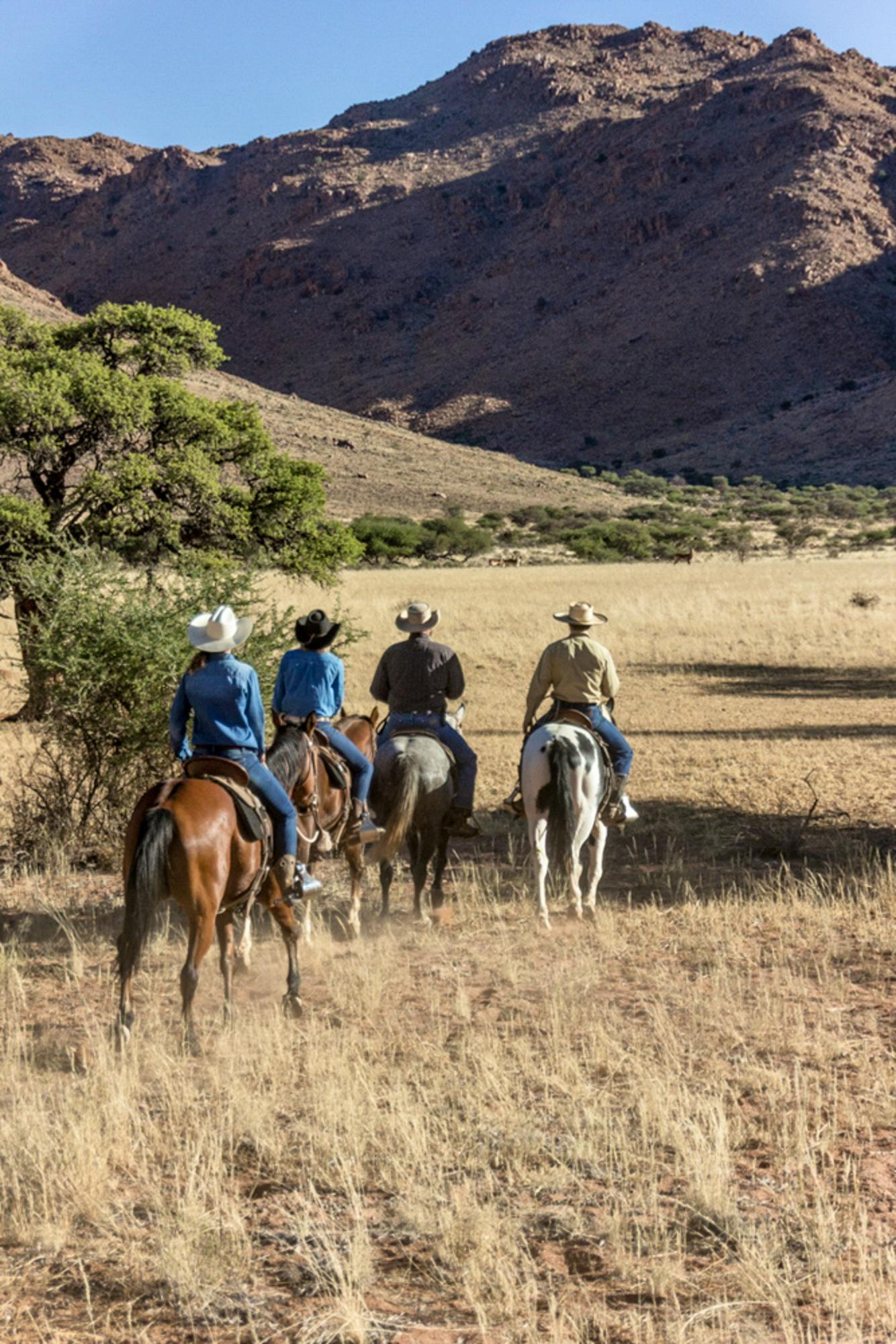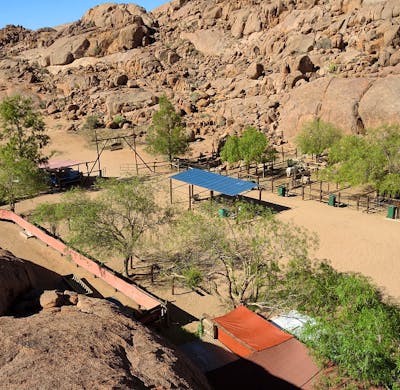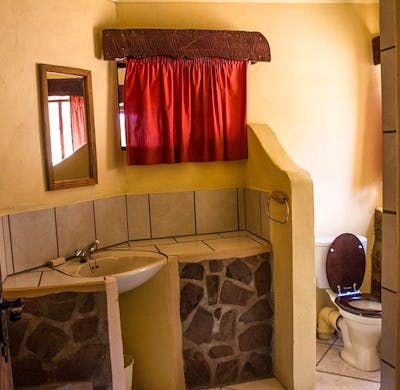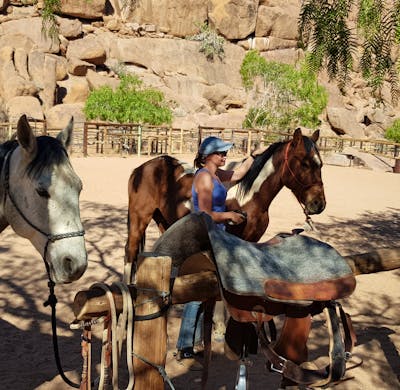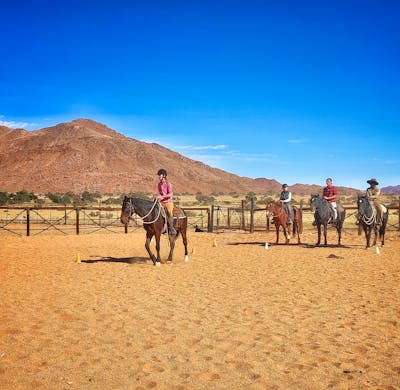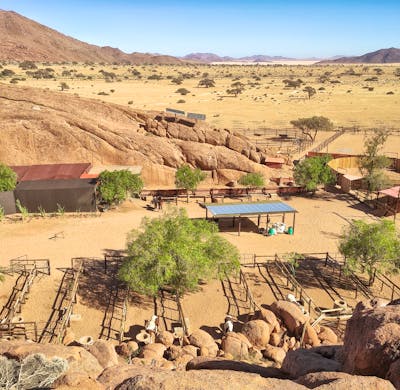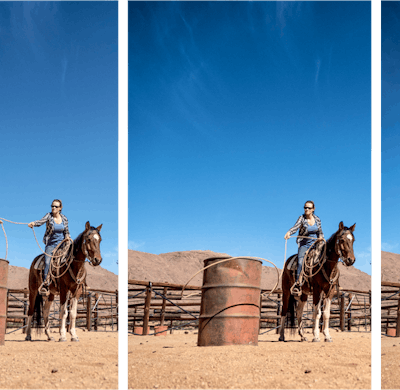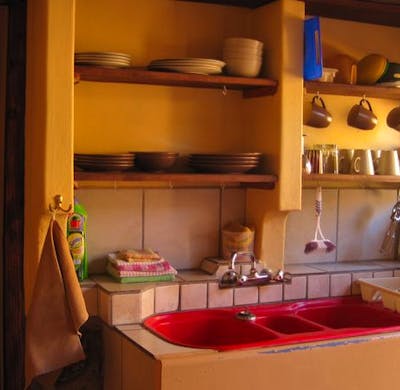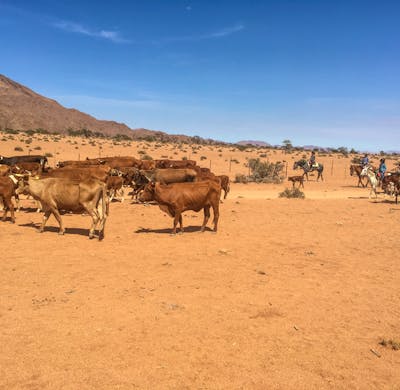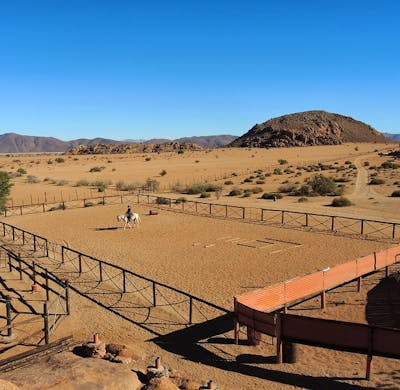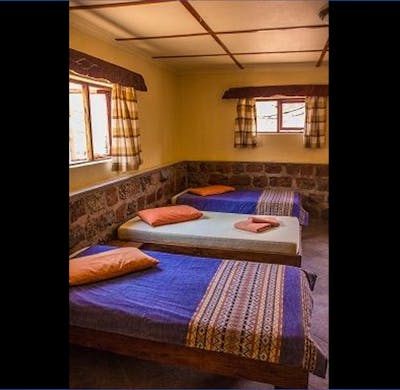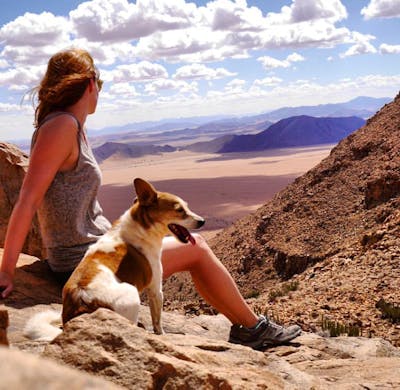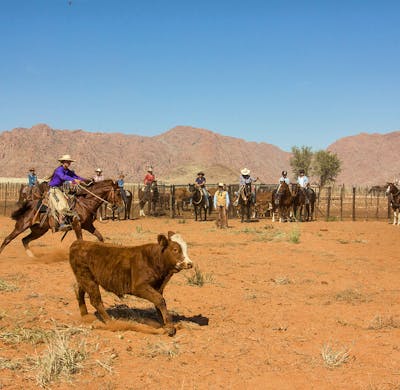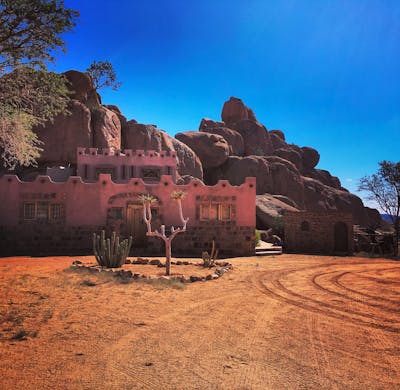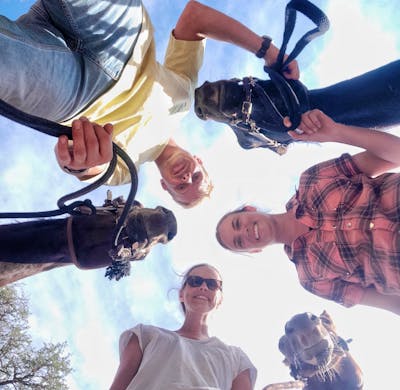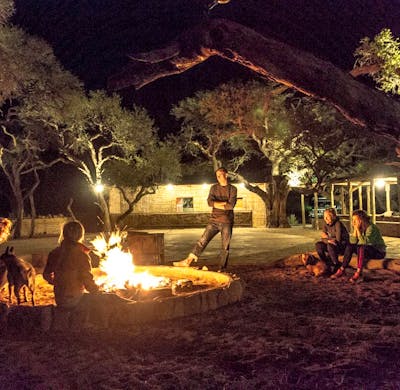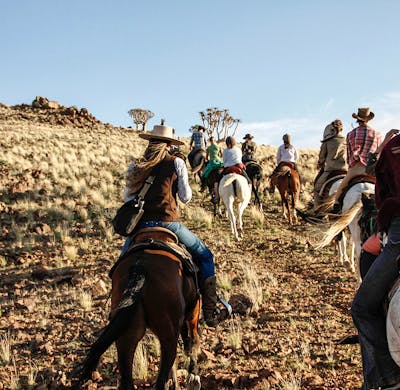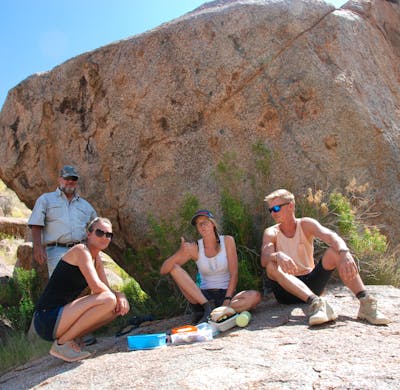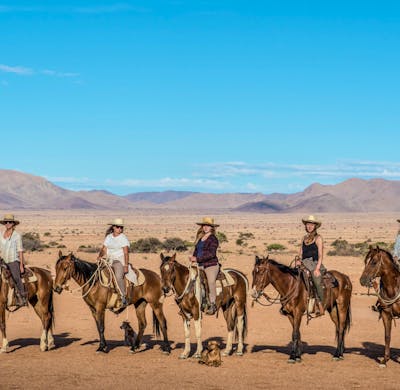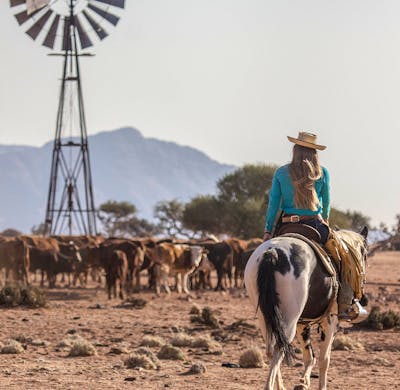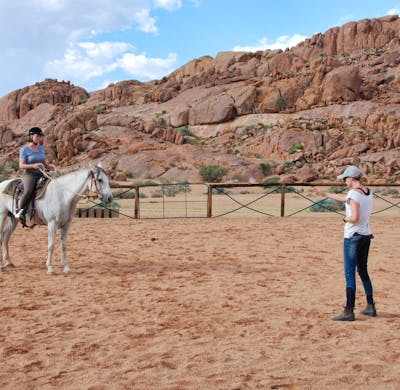Are
you an adventure seeker, outdoor enthusiast & want to experience
a piece of the wild & untamed Africa, all whilst being able to
follow your passion for horses and riding? Then we have just the
right spot for you!
Whether
you are taking a gap year, a break from your busy job / career or
just lust for something new, we can accommodate you into our program
& guarantee a once in a lifetime experience!
Our Volunteers are part of the day to day Ranch life here in Namibia. They gonna get a hands
on experience with the wide range of exciting activities:
- Ranch drives to our wild & free living horse herds
roaming around on the farm lands.
- Help out with the weaning process of the foals, halter - taming &
marking.
- Learn about the traditional way of colt starting & fine art of
horsemanship.
- Or do ground work and learn the basics of western riding.
- Take part in a daily training and schooling routine up at the cowboycamp.
- Cattle working: driving, sorting, roping, doctoring & branding!
- Join in on our cowboy trail
or star tours.
- Help us to keep our horses healthy and be there when there is a need.
- Sometimes of course you have to work from the ground, but 80% of your tasks will be directly related to horses.
What´s the emphasis of this program?
The emphasis of volunteer duties rely mostly around working with the
wild horses - assist with training and take part in general ranch work.
Where will the volunteers work?
The volunteers will word at the so called 'Cowboycamp'. The name comes from the former cowboy who used to life here. Now the caravans are renovated for the volunteers to spend their lunchbreak or just relax a little between the training sessions. The Cowboycamp has many paddocks where the horses stay during the working days. It also has a big riding arena and 3 roundpens. There are enough possibilites to bend your horse up for cleaning and saddling and were having a a small tack room with enough western saddles, bidals, halters and so on. If we have tour guests one task of the volunteers is it to help them to saddle up their horses, teach them what to pay attention to and of course to accompany the tour. Even if we have big tours for over a week, the volunteers are welcome to participate every ride.
With whom will the volunteers be working with?
Your gonna work with Freda and Imanuel. Freda is 32, from Germany and a fomer volunteer herself. She has been here many times and since the beginning of 2020 she is responsible for the volunteers and guides the riding tours. She trains the horses with you and will give you support whenever you need it.
Imanuel is native Namibian and working on Koiimasis since 3 years now. He is training the young horses when they come in the first time. You will learn a lot from him.
How old is the volunteer program?
Ranch Koiimasis has been accommodating volunteers regularely for the last 10 years.
How many volunteers may participate at once?
Up to 7
How much may the volunteers ride?
As
much as you possibly can & want. Most of the work gets done on
horseback, some days more, some days less. You will ride a variety of
different horses and will be able to learn a lot during your time.
What other tasks can wait for the volunteers?
- Feeding horses and give them water
- Cleaning & brushing them
- Cleaning, oiling and repairing riding equipment, like bridals, saddles or pads
- Sometimes cleaning the paddocks, normally the native worker do that.
- Assist with medical emergencies like colics, eye infections or wounds.
Who are we looking
for? What do we expect from our volunteers?
The minimum age is 18 years. As the volunteers are
self-sufficient in their accommodation, i.e. cooking, washing etc. you should
be able to do this yourself. Otherwise, you should be open-minded and
adventurous to fully engage with life here. And you should definitely be
"horse crazy". You don't have to be a horse trainer or
successful tournament crack to get by here. Nevertheless, you should have a
certain basic experience, be safe in the saddle and not be afraid. You also
don´t have to be a western rider. We teach you all you have to know about
riding in western style and ranch working on horseback.
Why pay for volunteering?
Your payment funds go straight back into the program but mostly the
horses, this way the ranch can afford to keep a unique program like this
going especially during years of bad drought and thus ensure volunteers
have an experience of their lifetime! Also horseriding isn`t real work for a real horsemen is it?
What to take along & what to leave at home?
Here is a small, certainly not quite complete, packing list:
- Clothing: Practical & sturdy clothing &
solid shoes. If you do visit between the months of May - October don`t
forget to pack something warm, the desert nights are known to drop down
to chilly temperatures.
- Riding clothes: Jeans / riding pants, boots, riding
helmet / cowboy hat. Long sleeved shirts.
- Optional: small pouch for
camera or phone.
- International travelling insurance (!)
- Hats: any kind of hat(s) that will cover most of your face & preferably ears too. The desert sun is harsh!
- Toiletries & other hygene products
- Handy travelling medical aid pack
- Swimsuit / trousers & swim towel in case you want to take a dip in the lodge pool.
- Sunscreen (can be bought in Windhoek too but it`s cheaper at home!)
- Sleeping bag
- Mosquito net & Mosquito spray
- International plug (south african compliance)
- Torch
- Something to read, as there is no TV in your accomodation and only limited internet access.
- A good pair of sunglasses that will stay on your nose whilst galloping through the middle of nowhere.
- Any other optional items eg: Camera, laptop, music box, powerbanks etc.
- Unfortunately any Hair driers, hair straighteners
or any other high power consuming devices won`t work on the ranch &
might as well be left at home.
FAQs for Ranch-Dudes
What is a Ranch-Dude?
As a Ranch-Dude, you will be actively involved in everyday ranch life, horse training and education. At
Koiimasis, horse trainers, Ranch-Dudes and guides always work hand in hand. Everyone learns from
everyone else and most of all from the horses. The term "Dude ranch" comes from the USA and means
nothing else than guest farm. We used to use the common term "volunteer", but this often led to
misunderstandings which we hope to clear up with the new name. The time as a Ranch-Dude is, so to
speak, a mixture of riding holidays and voluntary service - Working Holidays. That's why the stay is much
cheaper than a pure holiday. Your contribution goes 100% into the project - physically and monetarily.
Ranch-Dudes are an important part of our work for and with the horses. You get the chance to dive deep
into the daily life of a Namibian ranch and will experience things that remain hidden to a normal tourist.
As a Ranch-Dude you spend 90% of your time in the saddle and if you want to take a break, that's ok too -
everything can, nothing has to.
How long has the programme been running?
There have been regular Ranch-Dudes at Koiimasisfor over 10 years.
How many volunteers can help out at any one time?
Maximum 4
Programme and qualifications
What does the Ranch-Dude programme involve?
What do I actually do there? The main focus of your tasks is working with the horses. You help with
training and schooling and do real ranch work - i.e. work from the horse's back.
What qualifications do I need? You should already have some years of riding experience, ideally in western riding, as our horses are
exclusively western ridden. However, experienced riders from other riding styles are also welcome, as
long as they want to get involved with a new riding style and new training approaches. We will of course
help you to relearn. The project is not suitable for newcomers or beginners. We also have very nice
horses, but the main task of the Dudes is to train the horses, both in the field and in the arena. It's all
about permeability, gymnastics and health-maintaining riding. We also work our horses a lot on the
ground, do composure training and obedience exercises. If you are confident enough to do this, you are
very welcome to join us - good horsemanship is ultimately independent of riding style!
You should be at least 18 years old and able to look after yourself, as our Dudes live in their own little
house. You should be open-minded, adventurous and open for new things. Not be afraid of nature or
hard physical work and be open to new people. The minimum stay is 4 weeks, as it usually takes 14 days
to really arrive and settle in. Then it would be a shame to leave straight away - wouldn't it?
What kind of riding do you do and what is the training approach based on? At Koiimasis we ride exclusively in the Western style. Our training approach is based on the classic
California vaquero horsemanship, with the aim of creating an all-round horse that can be used for cattle
drives, roping, cutting, but also for trails and many other areas. Our older riding horses have been trained
by renowned international horse trainers and their students, such as Mark and Miranda Lyon whose
training style has been influenced by Ray Hunt, Buck Branaman, Martin Black and many other big names
in western riding. The horse training at Koiimasisis based on the goal of building a strong relationship
between horse and rider in order to obtain a horse that wants to serve its rider with body and soul -
without force or coercion!
The most important question: what about the horses? We have about 200 homebred American Paint and Quarter Horses. All with different levels of training. If
we see that you are able to train a young horse, you are welcome to join us. If your skills lie more in the
training and gymnastics of experienced horses, our oldies are also very happy about health-maintaining
training. Please note that we first have to get an idea of who you are and that you will be under our
control for a while. But if you prove yourself, you will soon be allowed to work independently.
Do I have to do stable work?
Stable work is of course part of the job. The paddocks have to be cleaned regularly, the tack taken care
of, the watering troughs cleaned and the plants watered. However, most of your work will be directly
with the horse.
Is there supervision?
You won't be left alone, if that's what you want to know. You will work with Freda and Immanuel (more
info later in the text). There is always someone there who can help you with all your horse questions and
always keeps an eye on how you treat the horses - also for your own safety. Nevertheless, you will be
allowed to work with your horses on your own responsibility. However, we cannot offer regular riding
lessons. Of course we will support you where we can, but you should be able to ride and train your horses
independently.
Can I accompany the riding safaris?
Yes, you may accompany the riding safaris. Of course, you will actively help and support Freda in looking
after the guests. If a guest has problems with his horse, you may have to change horses or give up your
ride. The guests only have one week at Koiimasis and pay about 4 times what you pay. You get the chance
to experience real life on a ranch in Namibia, look behind the scenes and be a very important part of the
team!
Please don't think of yourself as a second class guest during a horseback safari, because you, Freda and
Immanuel work as a team FOR the guests.
What do I do at the weekend? On Saturday you only work half a day, after that you have the weekend free. You can relax at the pool of
the lodge, climb the mountains of the ranch or do something with the other Dudes.
Booking and Journey
How do I book?
Please book directly via Volunteers World.
How far in advance do I have to book? Approx. 4 weeks (or less if it suits you) just ask.
When can I help and for how long? All year round, just ask if there are still places available. Please note that it gets very hot in the summer
months (Dec-Feb). The minimum booking period is 4 weeks, otherwise you just can't get into the daily
routine - and that's what a project like this is all about. The maximum duration is 90 days, due to the visa.
However, longer stays can be arranged in individual cases.
What if I get sick?
Travel health insurance is a booking requirement – you can't do without it. However, such insurance is
relatively inexpensive. A stay abroad of up to 6 weeks is already covered by many health insurances - just
ask your insurance company. For minor aches and pains there is sufficient medication at the ranch.
Otherwise, the nearest doctor is in Lüderitz. For the really bad cases, the ranch has an airstrip.
Country and people
Will I get homesick?
Maybe... Sometimes we have up to 4 Dudes on the farm, sometimes you might be the only one. It usually
takes about 14 days to really settle in, so if you adjust to that, it might be a little easier for you.
What languages are spoken?
German, English and Afrikaans
What about money?
The Namibian dollar is the currency of Namibia. One Euro is about 17.3 dollars. Since you start in
Windhoek, you can withdraw money here by credit card, for example, as there is no possibility of doing
so on the farm. However, some credit cards take a while to work in Namibia (from experience). If you
bring cash it is best to change money at the airport.
What do I need to know about Namibia? If you're getting scared now because of all the safety instructions, let me tell you that you don't have to
worry. The farm is very far from the nearest town and is its own little cosmos. You will mainly have to
deal with the farmers and every now and then you will meet tourists (mainly from Germany) who are on
holiday in the lodge or at the campsite. What you should really watch out for are scorpions, snakes and
the nasty thorns of the trees and bushes. But if you are a bit careful and take care of yourself, you have
nothing to fear here either.
Packing list
Here is a small, but certainly not complete, packing list:
- Clothing: practical, robust, easy-care clothing, sturdy shoes. Don't forget warm clothes, because in the
winter months (May-October) it can get quite cold in the evenings.
- Swimwear for a Sunday at the pool
- Riding clothes: breeches or jeans, boots or shoes suitable for riding. Sneakers are not(!) suitable for
riding.
- Riding helmet!
- Fanny pack for mobile phone etc.
- If necessary, shoes that you can ride and walk well in.
- Spurs only if you know how to use them!
- Travel health insurance! Please send us the necessary documents before arrival.
- Vaccinations: Tetanus
- Headgear: Cap or other, because the sun is merciless!
- Shower kit, cosmetics, toiletries, lip balm, etc.
- First-aid kit (at your discretion)
- Sun cream!
- Mosquito spray
- Cycling shorts if necessary
- Adapter for South African sockets, if necessary multiple plugs
- Torch
- Sleeping bag
- Hot water bottle for the winter months
- A good pair of sunglasses that stay on your nose when riding.
- You can leave the hairdryer at home, as well as similar things that use too much electricity.
- Pocket money, approx. 2,000 NAD
- USB stick, etc. to share the photos at the end.
- Camera, mobile phone, power bank...
Covid19 info
What if I am unable to travel due to Corona? If you are unable to travel due to Covid19 because you or a family member is infected, you are unable to
enter the country due to a travel warning, closed borders or cancelled flights, we will allow you to rebook
at a time of your choice free of charge. For up-to-date entry information, please keep yourself informed
via the website of your Foreign Office or the Namibian Embassy.
How safe is it for me in Namibia with regard to Covid? Of course, there is no general answer to this question. The greatest risk is on arrival and in the capital,
where legal restrictions are observed everywhere (masks are compulsory, etc.). On the farm, the risk is
very low because we are very far away from any city. As long as you keep the prescribed distance to our
guests and refrain from shaking hands, there should be no problems. Please make sure that your travel
health insurance also covers treatment for a Corona infection.
Entry at Corona times As of 07/22: Fully vaccinated travellers may enter with proof of vaccination. Unvaccinated travellers must
present a negative PCR test not older than 72 hours issued by a laboratory certified in the country of
departure upon entry. Please always print out everything DOUBLE in ENGLISH! In case of a transfer flight,
please inform yourself about the entry regulations of the respective country.
Exit at Corona times
As travel regulations change almost constantly, please plan a night in Windhoek at the end, in case a
Corona test is necessary. Currently (as of 07/22), vaccinated and recovered persons may enter Germany
without a test.
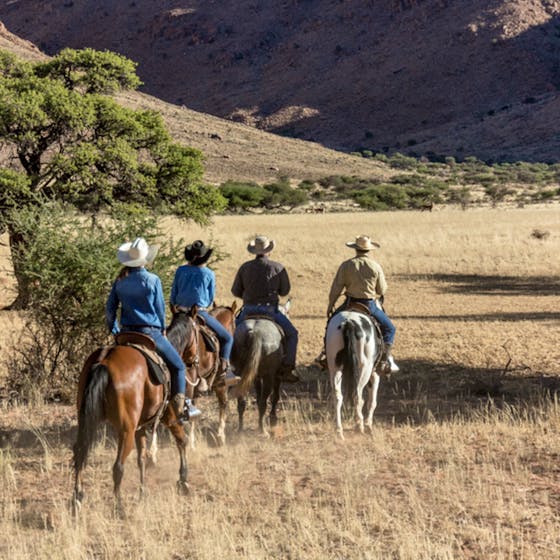
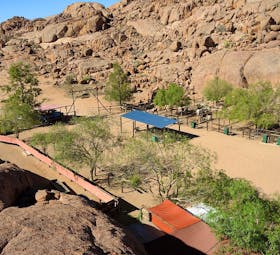
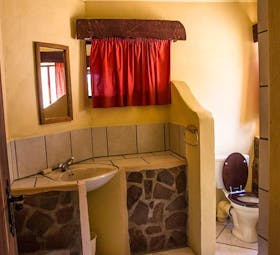
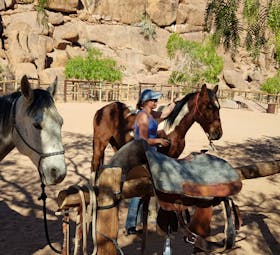
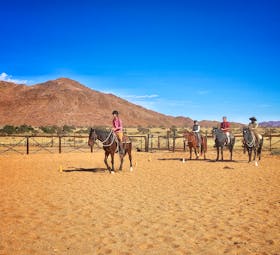
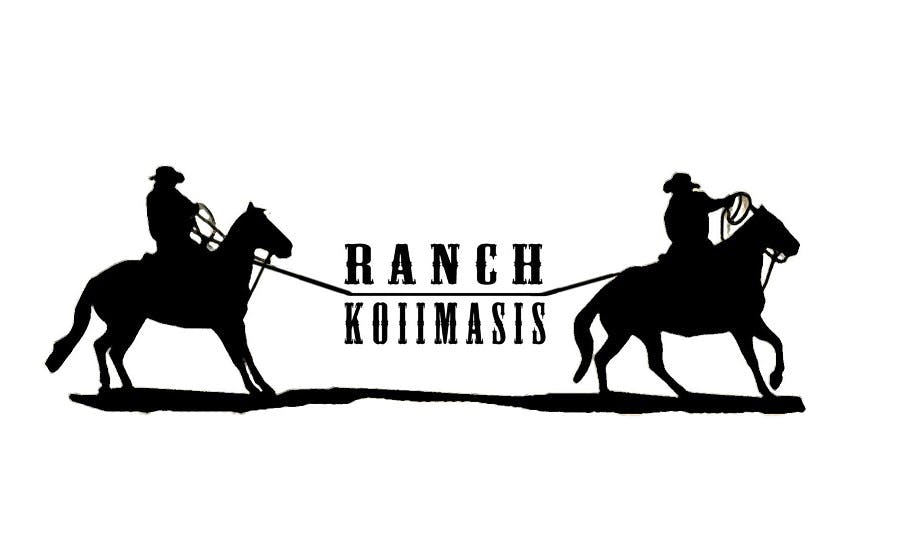
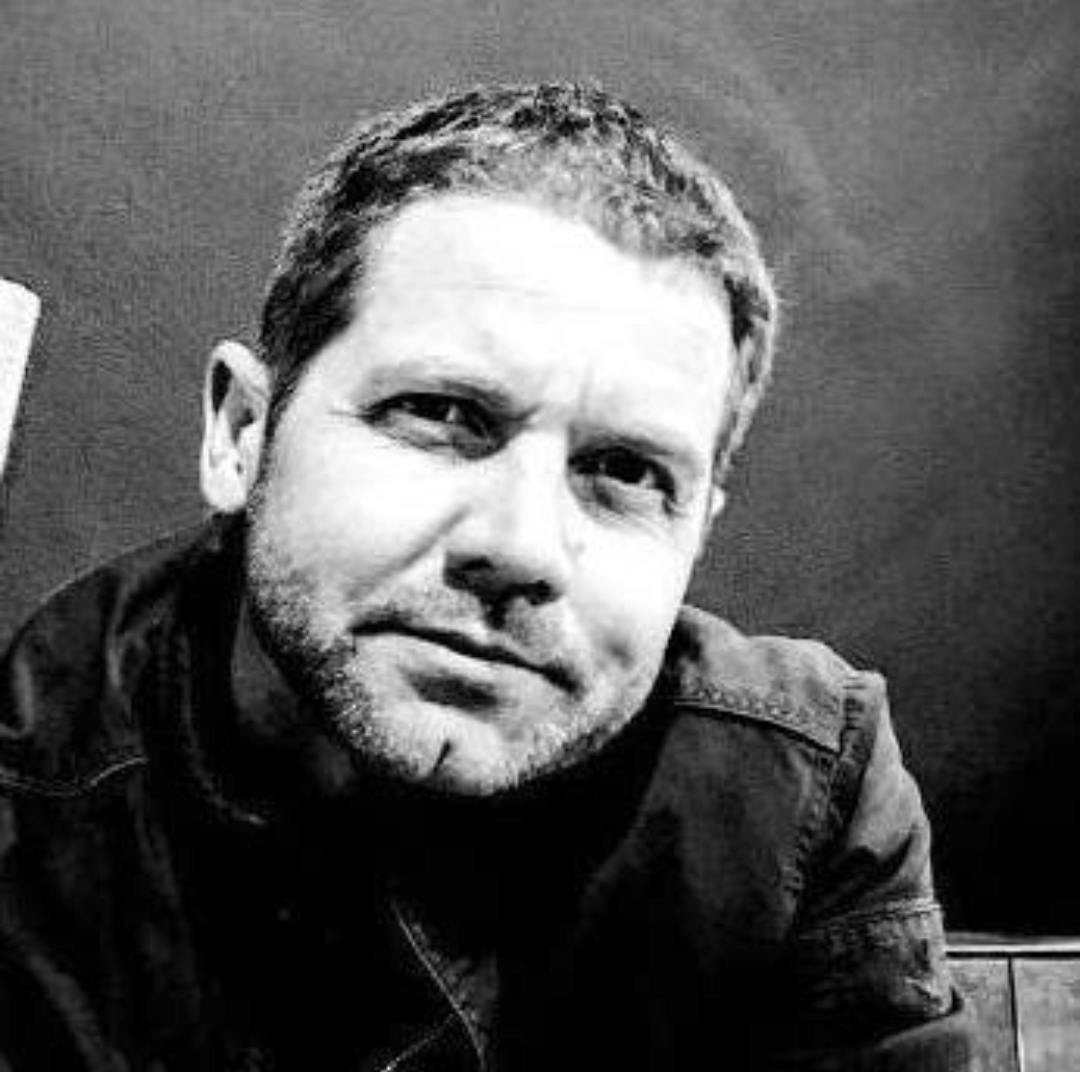
 4.9
4.9

